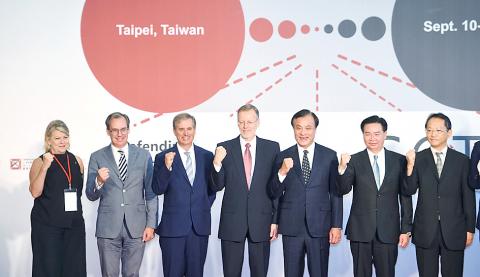Officials from the US, Japan and Sweden yesterday joined their Taiwanese counterparts for a workshop in Taipei on tackling disinformation, with some noting its rampant spread in Taiwan in the run-up to the presidential and legislative elections in January.
The two-day Defending Democracy through Promoting Media Literacy workshop is the second held under the Taiwan-US Global Cooperation Training Framework.
This year it was also cosponsored by Japan and Sweden.

Photo: Liu Hsin-de, Taipei Times
Addressing the opening ceremony, US Deputy Assistant Secretary of State Scott Busby, who is leading the US delegation to the workshop, praised Taiwan for its commitment to universally accepted human rights and democratic principles, including the fundamental freedoms of speech, religion, press, association and peaceful assembly.
These freedoms must be vigorously protected throughout the entire Indo-Pacific region, including in Hong Kong, he said.
“Taiwan’s 2020 elections are only a few months away, and China once again seeks to use disinformation to undermine the vote, divide the people, and sow seeds of doubt in democratic systems” through numerous channels, he said.
“Taiwan is also on the front line of this battle and faces the same challenge, albeit from a more determined opponent,” American Institute in Taiwan (AIT) Director Brent Christensen said.
The US and other nations have much to learn from Taiwan about how to marshal academic, policy and technical resources to confront that kind of external pressure, he said, highlighting the need to help citizens become “discerning consumers” of media reports.
Japan-Taiwan Exchange Association Deputy Representative Shigehiro Nishiumi called for a balanced approach to tackling the issues of disinformation while protecting freedom of expression, which is the “very foundation of democracy.”
Swedish Trade and Invest Council Representative Hakan Jevrell said people know that many actors use information to affect their behavior, which can be as harmless as trying to influence consumers to buy certain goods, but authoritarian states are using the tools to undermine democracy.
“We must be aware and act ... and continue educating ourselves and vaccinate ourselves against harmful information,” he said.
Minister of Foreign Affairs Joseph Wu (吳釗燮) reaffirmed Taiwan’s determination to safeguard its democracy, saying that dealing with false information is more important than ever when holding presidential elections.
The workshop, which is being held at the Taiwan Foundation for Democracy, is cohosted by the Ministry of Foreign Affairs, AIT’s Taipei office, the Japan-Taiwan Exchange Association, the Swedish Trade and Invest Council, the National Democratic Institute and the International Republican Institute.

A Ministry of Foreign Affairs official yesterday said that a delegation that visited China for an APEC meeting did not receive any kind of treatment that downgraded Taiwan’s sovereignty. Department of International Organizations Director-General Jonathan Sun (孫儉元) said that he and a group of ministry officials visited Shenzhen, China, to attend the APEC Informal Senior Officials’ Meeting last month. The trip went “smoothly and safely” for all Taiwanese delegates, as the Chinese side arranged the trip in accordance with long-standing practices, Sun said at the ministry’s weekly briefing. The Taiwanese group did not encounter any political suppression, he said. Sun made the remarks when

The Taiwanese passport ranked 33rd in a global listing of passports by convenience this month, rising three places from last month’s ranking, but matching its position in January last year. The Henley Passport Index, an international ranking of passports by the number of designations its holder can travel to without a visa, showed that the Taiwan passport enables holders to travel to 139 countries and territories without a visa. Singapore’s passport was ranked the most powerful with visa-free access to 192 destinations out of 227, according to the index published on Tuesday by UK-based migration investment consultancy firm Henley and Partners. Japan’s and

BROAD AGREEMENT: The two are nearing a trade deal to reduce Taiwan’s tariff to 15% and a commitment for TSMC to build five more fabs, a ‘New York Times’ report said Taiwan and the US have reached a broad consensus on a trade deal, the Executive Yuan’s Office of Trade Negotiations said yesterday, after a report said that Washington is set to reduce Taiwan’s tariff rate to 15 percent. The New York Times on Monday reported that the two nations are nearing a trade deal to reduce Taiwan’s tariff rate to 15 percent and commit Taiwan Semiconductor Manufacturing Co (TSMC, 台積電) to building at least five more facilities in the US. “The agreement, which has been under negotiation for months, is being legally scrubbed and could be announced this month,” the paper said,

Japan and the Philippines yesterday signed a defense pact that would allow the tax-free provision of ammunition, fuel, food and other necessities when their forces stage joint training to boost deterrence against China’s growing aggression in the region and to bolster their preparation for natural disasters. Japan has faced increasing political, trade and security tensions with China, which was angered by Japanese Prime Minister Sanae Takaichi’s remark that a Chinese attack on Taiwan would be a survival-threatening situation for Japan, triggering a military response. Japan and the Philippines have also had separate territorial conflicts with Beijing in the East and South China